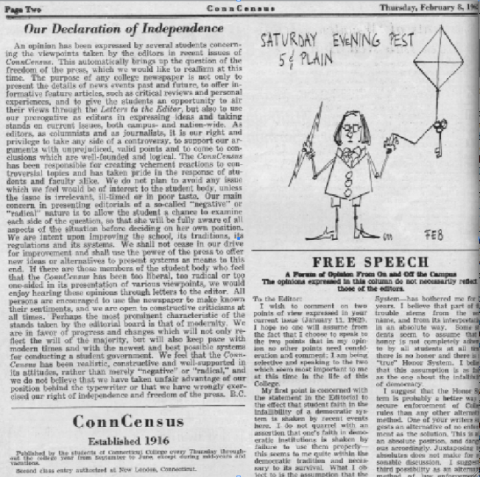Last week, when a Voice staff member was researching an article regarding Chris Bylone, former South Campus Area Coordinator for Residential Life, he approached the remaining professional staff to find some answers. Bylone’s resignation happened quietly over winter break, with an e-mail sent only to Housefellows and Floor Governors informing them that he wouldn’t be returning in the spring. The office refused to answer any of the writer’s questions, saying they would not comment on matters concerning personnel. Later that evening, the Residential Life student staff, myself included, received an e-mail encouraging us to follow their lead in not speaking on the matter: “…you are paid employees of the College and in that role, you are expected to exercise confidentiality with this and all personnel matters.” We gave up on the article.
The previous week, a different writer attempted to find information on the resignation of another member of the College: Robyne Watkin, former guest artist in the Dance Department. In this case, the greater college community was informed of her departure via e-mail over winter break, but upon returning, many students in the Dance Department preferred not to comment, calling it a sensitive subject. Additionally, many members of the Dance Department were not fully informed of the details on Watkin’s resignation.
I mention these two instances not only because of their timeliness and relevance, but also because I am a member of both groups involved— a former student of Robyne’s and a member of the Residential Life staff team—and I understand the jarring effect the removal of a staff member has on a department or office. I am not criticizing the Office of Residential Life nor the Dance Department for their reluctance to discuss these problems, but rather highlighting a general problem that the Voice, and I presume any publication, often runs into. It happened with Peter St. John, Lobstergate, and Lan-Lan: administrators don’t want to talk, students don’t want to put their name to their opinions. These aren’t unique situations, nor was I surprised.
Over winter break, Lilah sent the editorial staff a “Declaration of Independence” she found in an issue of the College Voice predecessor ConnCensus, written by Betsy Carter Bannerman ’62, the managing editor of the 1961-1962 school year. Lilah wants to paint it on our walls.
The declaration reads (you can read it in its entirety below): “As editors, as columnists and as journalists, it is our right and privilege to take any side of a controversy, to support our arguments with unprejudiced, valid points and to come to conclusions which are well-founded and logical. […] We do not plan to avoid any issue which we feel would be of the issue is irrelevant, ill-timed or in poor taste… we are intent upon improving the school, its traditions, its regulations and its systems. We shall not cease in our drive for improvement and shall use the power of the press to offer new ideas or alternatives to present systems as means to this end.” Betsy Carter sounds dope.
The italics are my own, but you get the idea. Education happens both inside and outside of the classroom. Yes, I have learned about my frontal lobe in psychology class, but I’ve also learned about navigating Harris at 6:30 on a Tuesday. It’s important that we exercise the ‘thinking critically’ muscles that we’ve developed at Conn, and Voice articles should push all of us to think deeper and consider the alternative, and if the paper isn’t doing that for you, let us know. We, as students, cannot let our education, informal or otherwise, be guided solely by hearsay and venues like ConnCollConfessional. We, as the staff of the College Voice, have a responsibility to uphold the newspaper as a forum in which students are not only informed, but also educated. We realize there are matters that people simply do not want to discuss, but it is our duty to press on and report back what we’ve found. We aren’t being self-righteous or intrusive: it’s why we’re here.

ConnCensus Declaration of Independence
“As editors, as columnists and as journalists, it is our right and privilege to take any side of a controversy, to support our arguments with unprejudiced, valid points and to come to conclusions which are well-founded and logical. The ConnCensus has been responsible for creating vehement reactions to controversial topics and has taken pride in the response of students and faculty alike. We do not plan to avoid any issue which we feel would be of interest to the student body, unless the issue is irrelevant, ill-timed or in poor taste…we are intent upon improving the school, its traditions, its regulations and its systems. We shall not cease in our drive for improvement and shall use the power of the press to offer new ideas or alternatives to present systems as means to this end. If there are those members of the student body who feel that the ConnCensus has been too liberal, too radical or too one-sided in its presentation of various viewpoints, we would enjoy hearing these opinions through letters to the editor. All persons are encouraged to use the newspaper to make known their sentiments, and we are open to constructive criticisms at all times. Perhaps the most prominent characteristic of the stands taken by the editorial board is that of modernity. We are in favor of progress and changes which will not only reflect the will of the majority, bt will also keep pace with modern times and with the newest and best possible systems for conducting a student government. We feel that the ConnCensus has been realistic, constructive and well-supported in its attitudes, rather than merely “negative” or “radical”, and we do not believe that we have taken unfair advantage of our position behind the typewriter or that we have wrongly exercized our right of independence and freedom of the press. B.C. [Betsy Carter]”









